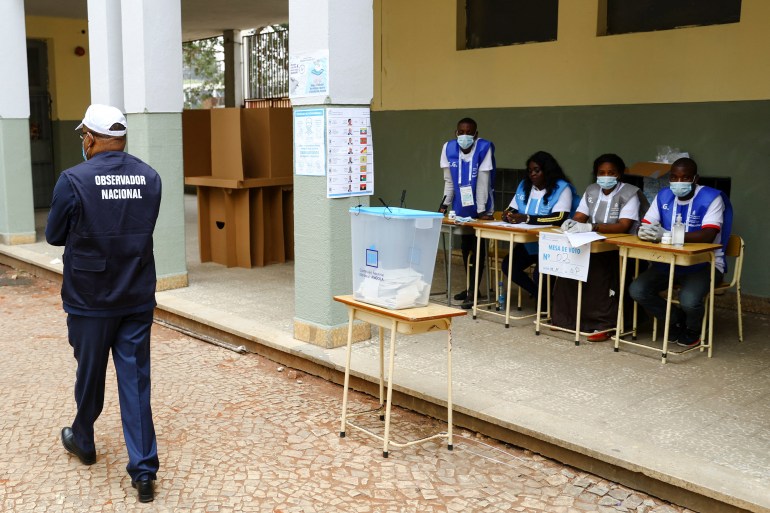 |
| Fewer than half of Angola's registered voters turned out for the election [Siphiwe Sibek/Reuters] Published On 26 Aug 202226 Aug 2022 |
The governing party in Angola has claimed victory in this week’s election after the electoral commission put its vote at 51 percent, but the leader of the main opposition coalition rejected the results.
Fewer than half of Angola’s registered voters turned out for Wednesday’s election, which appears certain to give President Joao Lourenco a second five-year term and extend the rule of the Marxist People’s Movement for the Liberation of Angola, or MPLA, which has governed the southern African oil producer since independence from Portugal in 1975.
With more than 97 percent of the vote counted, the election commission said on Thursday the MPLA was ahead with a 51 percent majority while its longtime opponent, the National Union for the Total Independence of Angola, or UNITA, had 44.5 percent.
“We have reached yet another outright majority. We have a calm majority to govern without any kind of problem and we will do it,” MPLA spokesman Rui Falcao told a news conference in the capital Luanda, a city that overwhelmingly voted for UNITA.
However, UNITA leader Costa Junior, addressing journalists and supporters for the first time since the vote, rejected what he called “brutal” discrepancies between the commission’s count and their own tally.
“There is not the slightest doubt that the MPLA did not win the elections,” he said. “UNITA does not recognise the provisional results.”
Junior called for an international commission to review the tally.
Wednesday’s vote was Angola’s most closely fought yet, with unprecedented gains for the opposition in parliamentary seats.
There are fears that any dispute could ignite violence and Junior urged Angolans to keep calm.
Low voter turnout
Junior must lodge a complaint to the commission, and if it is rejected, he can challenge the result in the Constitutional Court, which must rule on the matter within 72 hours.
The MPLA and UNITA, formerly both anti-colonial rebel groups, were on opposing sides of an on-off civil war after independence that lasted until 2002.
If the results tally stays as it is then UNITA, for the first time, will have deprived the MPLA of the two-thirds majority needed to pass major reforms – the governing party will instead need the backing of other lawmakers.
But perhaps even more telling was how few voters showed up to choose between two political entities which have dominated Angolan politics since independence. Election data released on Friday showed that turnout was 45.65 percent of eligible voters.
Lourenço, 68, has pledged to extend reforms in his second term, including privatising poorly run state assets. But many Angolans still live in poverty despite his promises of a fairer distribution of wealth in Africa’s second-biggest oil producer – a fact which benefitted UNITA, popular with poor, unemployed young people.
UNITA posted an image of Junior on its official Instagram account with the caption: “The President”. The MPLA posted a social media video of Lourenço thanking Angolans for the election outcome.
SOURCE: NEWS AGENCIES







No comments:
Post a Comment